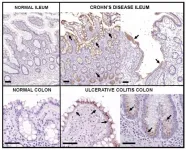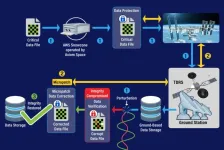MSK Research Highlights, August 10, 2023
2023-08-10
(Press-News.org)
New research from Memorial Sloan Kettering Cancer Center (MSK) and the Sloan Kettering Institute — a hub for basic science and translational research within MSK — found a potential target against neuroendocrine transformation in lung and prostate cancers; discovered new clues about why donor T cells attack certain tissues in graft-versus-host disease; shed light on why T cells let go of their prey; and used CRISPR interference and dynamic cell-state transitions to discover enhancers that affect early human development.
Targeting exportin 1 may help prevent neuroendocrine transformation in lung and prostate cancers
Over time, some lung and prostate cancers gain resistance to treatment by transforming from adenocarcinomas to neuroendocrine tumors, which are more aggressive. New research from the lab of Charles Rudin, MD, PhD, led by lab Co-Director Álvaro Quintanal-Villalonga, PhD, looked at the role of the protein exportin 1 in these cancers, which transports other proteins from the cell nucleus to the cytoplasm. The research showed exportin 1 expression was elevated at early stages of neuroendocrine transformation and that its inhibition with the drug selinexor suppressed the transformation in mouse models, extending the response to targeted therapies. The findings suggest that inhibiting exportin 1 could present a therapeutic opportunity to help prevent or treat neuroendocrine transformation in lung and prostate cancers. in Science Translational Medicine.
New clues about why donor T cells attack certain tissues in graft-versus-host disease
Graft-versus-host disease (GVHD) is a potentially fatal complication of stem cell and bone marrow transplants (BMTs) that use donor cells. BMTs may be used to treat blood cancers and some inherited blood disorders. GVHD occurs when T cells from the donor attack healthy tissues in the transplant recipient. It can affect many organs, especially the skin, liver, and gastrointestinal (GI) tract. Although T cells in the blood have been well studied, until now, little has been known about the makeup of the T cells that cause GVHD in the diseased tissues themselves. Now investigators from MSK have found clues about why donor T cells attack specific tissues.
Bone marrow transplant specialist Jonathan Peled, MD, PhD, and leukemia specialist Susan De Wolf, MD, led the research in Dr. Peled’s Memorial Hospital research lab and in collaboration with the labs of Marcel van den Brink, MD, PhD; Benjamin Greenbaum, PhD; and Christine Iacobuzio-Donahue, MD, PhD. The team collected tissues from seven patients who had died of or with GVHD, as well as samples from lab mice with GVHD and three control patients who did not have GVHD, then analyzed the T cells found in these tissues. They noted different patterns in the makeup of the T cells, based on where they clustered in the body. For example, T cells found in the esophagus and colon, both parts of the GI tract, were more similar to each other than T cells found in the skin and liver. By understanding more about the features of these harmful T cells, the researchers may eventually find new ways to prevent or treat GVHD. in Science Translational Medicine.
Why T cells let go of their prey
Cytotoxic T cells are immune cells that fight pathogens and cancer cells by forming a specialized attachment to them — a cytotoxic immune synapse — and injecting molecules that kill the cell. As the target cell dies, the immune synapse dissolves, leaving the T cell free to search out new prey. Now, research from the immunology lab of Morgan Huse, PhD, of the Sloan Kettering Institute, has answered a key biological question: What causes T cells to detach from the dying target cells? The team, led by postdoctoral fellow Elisa Sanchez, PhD, used time-lapse imaging and a series of genetic and pharmacological experiments to show that the contraction of the dying cell’s cytoskeleton triggers the release — enabling the T cell to continue its patrol. Further research is underway to understand the biomechanical feedback mechanisms that enable T cells to know when to let go. in Nature Immunology, including a related research briefing.
Using CRISPR interference and dynamic cell-state transitions to discover enhancers that affect early human development
Enhancers are regulatory DNA sequences that change the way genes are expressed. Mapping enhancers to genes is essential for understanding cell type-specific gene expression that is relevant to normal development, tissue regeneration, and disease. But because most disease-relevant enhancers have effects that may be weak or only temporary, they’ve been difficult to study. Researchers have sought better models for finding and studying enhancers in both normal and diseased cells. Now a team of investigators from MSK’s Sloan Kettering Institute and Johns Hopkins University reports that dynamic cell-state transitions can be leveraged to improve the sensitivity of enhancer discovery.
Developmental biologist Danwei Huangfu, PhD, and graduate student Renhe Luo led the team at MSK; biomedical engineer Michael Beer, PhD, MA, was the senior author from Johns Hopkins. They focused on enhancers required for the differentiation of the definitive endoderm, the layer of embryonic cells crucial for the formation of many internal organs. By applying CRISPR interference in human embryonic stem cells, they targeted potential enhancers surrounding 10 core transcription factors, covering a total span of 40 million base pairs. They were able to identify multiple enhancers (between four and nine per locus) flanking each transcription factor gene. The comprehensive discovery of enhancers led to the development of improved enhancer-prediction methods. This work highlighted the importance of leveraging cell-state transitions — either normal or pathological — for finding enhancers across various biological contexts. in Nature Genetics.
END
ELSE PRESS RELEASES FROM THIS DATE:
2023-08-10
A new study of mice and lab-grown human colon “organoids” indicates that an experimental drug developed by Johns Hopkins Medicine researchers can substantially reduce symptoms of inflammatory bowel disease (IBD) in pre-clinical models.
The experimental drug, given orally, inhibits a gut enzyme that is overproduced in people and in animal models of IBD, a disorder estimated by the U.S. Centers for Disease Control and Prevention to afflict more than 3 million adult Americans.
A report on the new study was published Aug. 9 in Science Translational Medicine.
IBD, a disease category that includes Crohn’s ...
2023-08-10
NASA’s Parker Solar Probe executed a short maneuver on Aug. 3, 2023, that kept the spacecraft on track to hit the aim point for the mission’s sixth Venus flyby on Monday, Aug. 21, 2023.
Operating on preprogrammed commands from mission control at the Johns Hopkins Applied Physics Laboratory (APL) in Laurel, Maryland, Parker fired its small thrusters for 4.5 seconds, enough to adjust its trajectory by 77 miles and speed up – by 1.4 seconds – its closest approach to Venus. The precise timing and position are critical to that flyby, the sixth of seven approaches in which Parker uses the planet’s gravity to tighten ...
2023-08-10
Scientists from the German Cancer Research Center (DKFZ) and the Cambridge Stem Cell Institute have developed an AI system that recognizes and characterizes white and red blood cells in microscopic images of blood samples. The algorithm can help physicians diagnose blood disorders and is available as an open source method for research purposes.
Blood disorders are often characterized by altered numbers and aberrant shapes of red and white blood cells. To diagnose the diseases, physicians classically examine blood smears on a slide under a microscope. This type of diagnosis is straightforward, but evaluation by experienced experts is difficult because the changes are sometimes ...
2023-08-10
UPTON, NY– Registration is now open for the third Quantum Information Science Career Fair hosted by the U.S. Department of Energy (DOE) Office of Science’s National Quantum Information Science (QIS) Research Centers. The virtual event takes place on Wednesday, Sept. 13.
The event aims to make undergraduates, graduate students, postdocs and early-career professionals aware of the wide range of QIS careers they can pursue—including technical and scientific roles as well as positions that facilitate research and bring awareness to the field, such as ...
2023-08-10
(WASHINGTON, August 10, 2023) – Researchers in Italy have shown for the first time that among children who have undergone a donor stem cell transplant, the presence of diverse species of micro-organisms in the intestinal tract before the transplant resulted in significantly better overall patient survival and fewer complications. The study, published today in the journal Blood, adds to a growing body of research unraveling the role gut health plays in health outcomes.
“Our study provides the first evidence of a relationship between pre-transplant microbial diversity in the intestinal tract and post-transplant ...
2023-08-10
San Antonio – August 10, 2023 – Southwest Research Institute developed an algorithm to remotely update and repair spacecraft software using less time and data than conventional techniques.
The tool not only improves the overall efficiency of satellite software transmissions but also can recover data from failed over-the-air updates and malicious cyberattacks. It works by identifying missing bytes and other errors before deploying a custom “micropatch” to the damaged or missing software.
“Instead of updating an entire file or operating system, which is typically required with over-the-air satellite software updates, our ...
2023-08-10
New research confirms fracking causes slow, small earthquakes or tremors, whose origin was previously a mystery to scientists. The tremors are produced by the same processes that could create large, damaging earthquakes.
Fracking is the high-pressure injection of fluids underground to extract oil and natural gas. Though it is typically done with wastewater, this study examined data from fracking with liquid carbon dioxide. The process pushes carbon underground and keeps it from trapping heat in Earth’s atmosphere.
By some estimates, carbon dioxide fracking could save as much ...
2023-08-10
London, United Kingdom, 10 August 2023 – Four major clinical trial networks based in low resource settings are embarking on an exciting partnership with the Good Clinical Trials Collaborative (“GCTC”) to enhance clinical research in low resource settings. By promoting the unique qualities of randomized controlled trials (RCTs) and the evidence they produce, the collaboration aims to support regional research ecosystems to prioritize collaborative, informative and efficient research responses to public health challenges.
ADVANcing Clinical Evidence in Infectious Diseases (“ADVANCE-ID”), Africa ...
2023-08-10
Washington, D.C. – Following the first stay-at-home orders issued in the U.S. to curb the spread of COVID-19, gastrointestinal viruses such as norovirus, rotavirus and adenovirus all but disappeared from California communities, and remained at very low levels for nearly 2 years. The research is published in the Journal of Clinical Microbiology, a journal of the American Society for Microbiology.
Interestingly, these viruses surged back to pre-pandemic levels in late 2022, said Niaz Banaei, M.D., professor of Pathology and Medicine (Infectious Diseases), Stanford University, and Medical Director of Clinical Microbiology Laboratory, Stanford Health Care. “Adenovirus ...
2023-08-10
INDIANAPOLIS – As the population of the United States grows older, more and more family members will be called upon to make medical decisions during hospitalizations of those who cannot make decisions for themselves. Good quality, focused, empathetic and timely communication between family members and clinicians is essential for good decision-making.
Researcher-clinicians from Regenstrief Institute and Indiana University School of Medicine developed the 30-question Family Inpatient Communication Survey (FICS) to measure the experience of communication with hospital staff from the perspective of family members of seriously ill patients unable ...
LAST 30 PRESS RELEASES:
[Press-News.org] MSK Research Highlights, August 10, 2023




